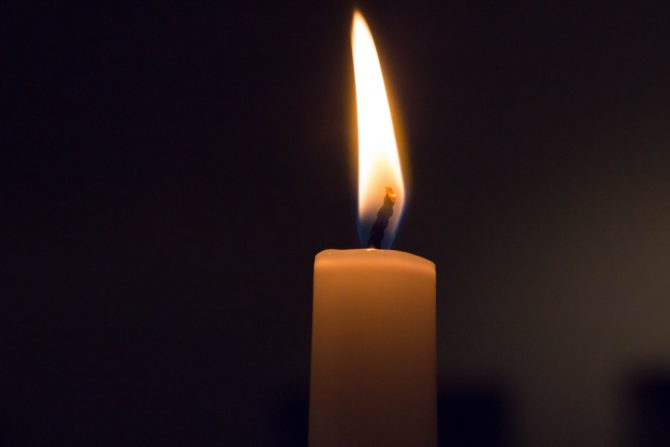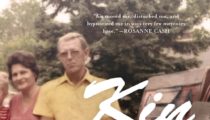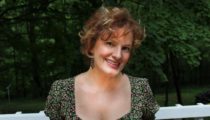It’s six a.m. on an April morning. I sit at…

Gone
It is the week after my eldest living aunt has, with us all in proximity, buried her sister.
It is the second sister, out of nine siblings, she has buried. Her youngest brother, gone too.
My Aunt Rosetta, of course, did not lift her eighty-five-year-old, tiny, weathered limbs toward
a shovel, did not plunge it deep into Pennsylvania dirt, did not evict all the tiny
organisms, happily soil-rich and nutrient-drunk, to make room for a concrete vault
cocooning death from spilling into that dark, dank, underground world, in which
a crank, not my aunt’s hand, lowered the silver-shellacked box down slowly,
as a cracking voice barely squeaked out the song—Some glad morning when this life is
over, I’ll fly away. To a home on God’s celestial shore, I’ll fly away. I’ll fly away, Oh glory,
I’ll fly away. When I die, Hallelujah, by and by, I’ll—and the singer could not get to flight
a fifth time, her voice clipped by the squawk of a bird soaring overhead, and we looked
up into the lustrous blue staring directly into a sun that swung white, covering
everything in a quick blank flash like a camera capturing us, and not the other way
around. My aunt calls this a sign. We are trained to make myths of our losses,
perfume our sadness with the incense of hope. Even ailments serve purpose: A palm
itch means money is on the way. Aching bones promise rain will cleanse our debts.
My aunt says her sister, Velma, whose body languished in death, confused by breath
and disinterest in food and drink, nurses with needles, bagged meds and IVs,
was singing back to us, letting us know she been flown the coop of that casket, been
knocked on the doors of Heaven and let into its gates, pearled and gleaming, done
met her twin brother born dead in the womb, the one no one speaks of, the one my
Aunt Rosetta—sitting at the faux wood kitchen table, near the TV broadcasting Life-
time dramas and ads for white sandy beaches—says she can still see in her mind’s
eye, how he was not birthed yella and hollering like Velma, but came out without
sound, came the same color blue as his black daddy’s eyes. Says she can still
remember her Daddy, shuffling around the two-room shack a miner’s pay borrowed,
searching for newspaper to wrap all the lack lodging in his still-beating heart, while
he covered his stillborn namesake, carried him away, round the side of the mountain
where men buried coal ash, where he might have hoped the boy renewed his strength,
mounted up with wings like eagles, and took off, singing I’ll fly away. Oh, glory, I’ll
fly away. I tell Aunt Rosetta so many of our men have fledged, have not permitted us
the satisfaction of their deaths, have not even left us with a trace of white feathers.
There is no hymn for this. No balm. My father, I tell her, was no bird. He did not crow,
did not flap a brilliant plumage, announcing, as a white flag might,
his defeat. One day, he was just gone. My aunt tries to name all our living losses,
for all we try to seek peace: Her son, once track-star, turned marketer,
turned hospital deserter after another man died beneath his bumper. Another son
who loss language in a hospital bed after another man bat-crushed his head
for stealing his woman without paying. Her grandson whose head was so full
of voices that he forgot his last name, knew only cardboard beneath palm trees near
a beach lined with needles. She tries to name them. He is —. She stops. He was —.
She stops again. He would have been —. We can’t sing with certainty about our men.
We don’t look up at the sky and see their wings, like Aunt Velma’s, cut across clouds.
We won’t toss chopped-off rose-heads at their buried beaks. We can’t call them—
dead.



